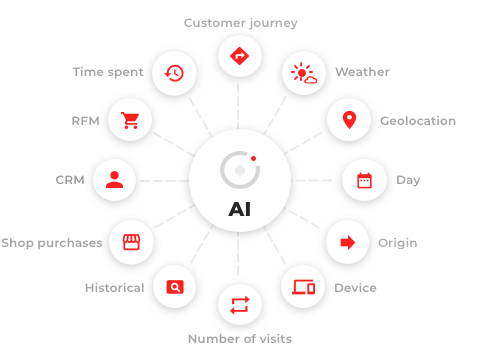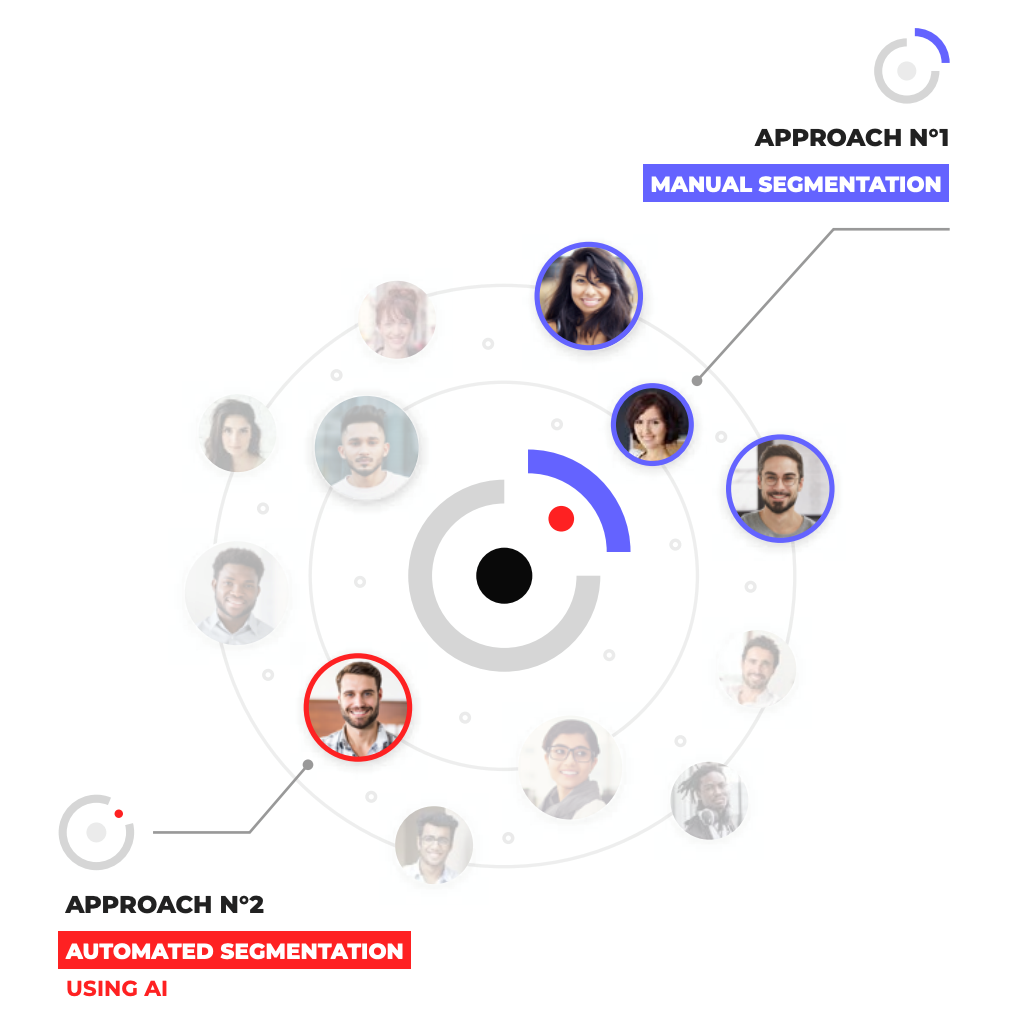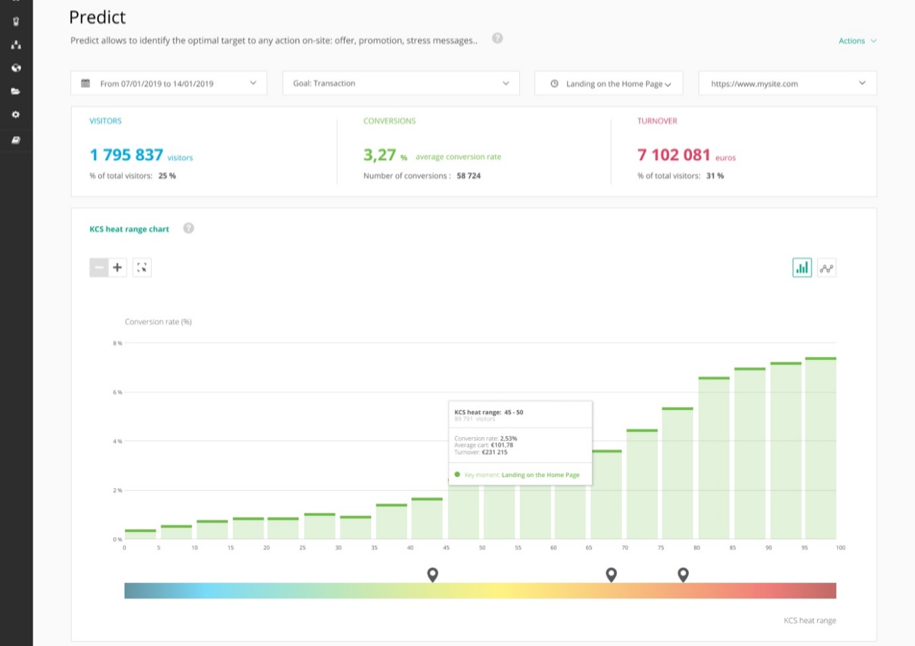
Digital marketing: why use artificial intelligence?
Artificial intelligence is a set of techniques that enable a machine to perform cognitive functions that typically require human intelligence. These include the ability to learn, to reason and to interact with the environment around the machine. The most well-known artificial intelligence (AI) techniques are machine learning and deep learning.
The discipline is now used in many fields, including medical diagnostics, self-driving cars and facial recognition.
AI also has many applications in digital marketing including improving targeting, personalization, social listening and content creation.
How does it work in digital marketing? What algorithms are used and where can they be applied? Above all, what are the benefits?
1 Artificial Intelligence: how does it work?
The term Artificial Intelligence covers any learning system that enables algorithms to perceive signals, solve problems, reason and learn continuously.
It includes several practices. Machine learning and deep learning are among those that are used most often when the goal is to improve marketing performance.
Deep learning algorithms
Predominantly, these enable large quantities of data to be processed quickly, freeing up marketers’ time. For example, deep learning is used for facial or voice recognition and image classification.
Machine learning algorithms
These algorithms spot patterns and learn in order to make predictions and recommendations. The key advantage of these algorithms is that they improve over time thanks to continuous learning.
There are different types of learning for these algorithms, each with different goals.
Supervised learning
Algorithms are fed with a set of training data. It then makes real-time predictions based on the training set and is then corrected by a supervisor. The learning phase is complete when the level of predictive performance meets a set level of accuracy.
Unsupervised learning
Algorithms autonomously model similarities between the data to understand the structure of the information, but without restricting themselves to any limits imposed by human supervision. However, it is the marketer who indicates to the algorithm which data needs to be analyzed and they decide whether or not to act on the algorithm’s conclusions.
Reinforcement learning
What distinguishes this type of algorithm is that it doesn’t receive instructions to perform an action - it finds the solution by itself. For example, while calculating a visitor’s conversion probability, it will be rewarded if its prediction is right and punished if its prediction is wrong. Since the algorithm’s goal is to maximize its rewards and minimize its punishments, it learns from its own experience, honing its predictive capacity thanks to dynamic programming.
Kameleoon’s artificial intelligence relies on different algorithms:
- supervised algorithms to recognize behavioral trends within a population that is already known;
- unsupervised algorithms to create data “clusters” such as building visitor segments according to purchasing behavior (types of pages viewed + categories of products viewed + average cart size, etc.), or to create rules connecting larger portions of data, such as: “visitors that bought product A are very likely to have this type of journey and use this type of device”;
- reinforcement algorithms to learn from visitor behavior and calculate their likelihood of future purchasing with increasing accuracy.
2 The benefits of artificial intelligence applied to marketing
Digital giants such as Amazon, Google and Microsoft have been using artificial intelligence to improve their products and services for several years.
Today, other brands are also able to use artificial intelligence, thanks to solutions that make it easier to access this technology. 84% of marketing leaders think that AI is essential to achieving their objectives.
Time savings and better task execution thanks to artificial intelligence
Artificial intelligence has many applications in the field of marketing and can automate a number of tasks as well as improving day-to-day practices.
AI helps marketers by saving them time on tasks that are complex or even impossible to perform manually within a reasonable timeframe.
Marketing teams are therefore able to free up more time to devote to strategic challenges, since all they need to do is configure the algorithms and then analyze their output.

Artificial Intelligence & marketing, Golem.AI
Better ROI with artificial intelligence
Artificial Intelligence can process more tasks, more accurately and within a very short timeframe or even in real-time. It therefore enables marketers to significantly increase their ROI by boosting their marketing actions.
According to recent Accenture research, companies that invest in AI can expect to increase their revenue by around 30% over the next four years.
This is not a surprise. Based on our clients’ use cases, we can see how AI-driven personalization drastically increases both online conversions and ROI.
> Take the example of Cdiscount, which doubled the ROI of its promotional campaigns.
3 Boost your digital marketing actions with artificial intelligence
There are multiple uses for artificial intelligence in digital marketing strategies, helping marketers achieve goals such as:
- Engaging customers
- Increasing conversions
- Boosting retention
Here are key examples of actions you can optimize using AI:
Collecting and analyzing data
When collected and used correctly, data is the cornerstone of all marketing activity. However, the work involved is time-consuming and painstaking for marketers.
In this area, artificial intelligence can perform the tasks that it would be impossible for humans to process because they would take too much time or be imperceptible to the human eye:
- AI can take high volumes of data into account in real-time and process it using pre-defined rules
- AI is capable of identifying information such as conversion propensity, or interest in one product or message rather than another.

Segmenting and analyzing your audience
For marketers to reach their customers and prospects with the right level of personalization, it is essential to create relevant segments.
Brands can segment manually by determining setting criteria in advance. For example: they can build segments of visitors who have already made a particular purchase or based on their gender. However, this method is not always accurate as it doesn’t always take into account visitors’ needs at the exact moment of their visit.
Take an example: a customer visits a website from which they bought a washing machine two weeks earlier. This time, they are looking to buy a travel guide for a friend. By using previous purchases as the basis for segmentation, the site would logically suggest a washing machine to this customer. However, that is not what this visitor is looking for. .

Artificial intelligence is capable of segmenting your audience in real-time based on their current behavior, then creating segments with very detailed criteria, such as undecided visitors or those interested in a certain product or message.
Additionally, with artificial intelligence, segments are not static. They evolve depending on the visitors’ purchasing intention or receptiveness.
At Kameleoon, our algorithm gives each visitor a propensity score, called the Kameleoon Conversion Score (KCS™), based on their conversion probability for the intended goal. The marketer can then visualize this in the form of a graph that groups together visitors by heat range.

Personalizing your website
Consumers are looking for exceptional customer experiences adapted to their needs online. One of the greatest challenges for marketers is being able to adapt their website to each visitor, given their wide range of interests and requirements.
Personalization enables you to adapt each element of your website in real-time based on the visitor segments you have identified.
With artificial intelligence, you can trigger actions in real-time based on the segmentation performed by the algorithms. This enables you to prioritize your actions and, above all, to optimize your marketing budget, as targeting is much more accurate.
It is then possible to personalize many elements in real-time based on the visitor’s purchasing probability or receptiveness:
- product recommendations
- messages
- content (banners, pop-ins, etc.)
- browsing experience (discounts or coupons offered)
- search results
- emails
Importantly, the personalized experience evolves according to the visitor, since the experience provided depends on the data collected in real-time.
Listening to your visitors (social listening)
To monitor your brand image online, it is essential to constantly analyze the web and social media.
The volumes of such data are continually growing, as are the range of formats it is available in (such as text, images or videos). It is increasingly difficult to process this all manually.
Artificial intelligence can automate this task and, in particular, obtain much more accurate information much quicker. It is the ideal tool for identifying a new influencer for your brand or spotting a potential crisis before it develops.
In addition, AI can perform tasks that were impossible to do manually, for example:
- analyze web users’ feelings, something that was very difficult to establish using traditional methods like scoring.
- analyze images in which there is a product, a logo, etc.
Communicating with your audiences via chatbots
When visitors are on your website, they want to be able to easily contact you if they have questions. When relying solely on human staff it can be difficult to process a high volume of requests simultaneously, particularly as they may come in at any time of the day or night.
Chatbots, which run on an AI algorithm, can provide an immediate response around the clock. Based on understanding queries they can deliver relevant answers in real-time, boosting customer satisfaction.
Chatbots are flexible, meaning they can be used in different way depending on a brand’s requirements:
- A chatbot could answer all visitor requests on the website.
- A chatbot could collect feedback by asking visitors to talk about a specific subject (such as their views on the website or individual products).
- A chatbot could automatically put visitors in touch with the best qualified person to answer their query.
However it is deployed, a chatbot can save considerable time while increasing satisfaction by providing visitors with a customized response 24/7.
Creating content
Artificial intelligence also enables marketers to automatically generate content when they don’t have the necessary in-house resources.
Demonstrating this, Heliograf, The Washington Post’s artificial intelligence program, has already written more than 800 articles ranging from sports news to politics.
AI content creation enables brands to focus their resources on bigger projects that require more extensive writing work. Also it will not be superfluous to consult with a specialist in writing works like IvoryResearch.
Artificial intelligence is now essential to marketing success. To find out more about its benefits for targeting and personalization, download our ebook or request a demo of our AI-driven personalization platform.




